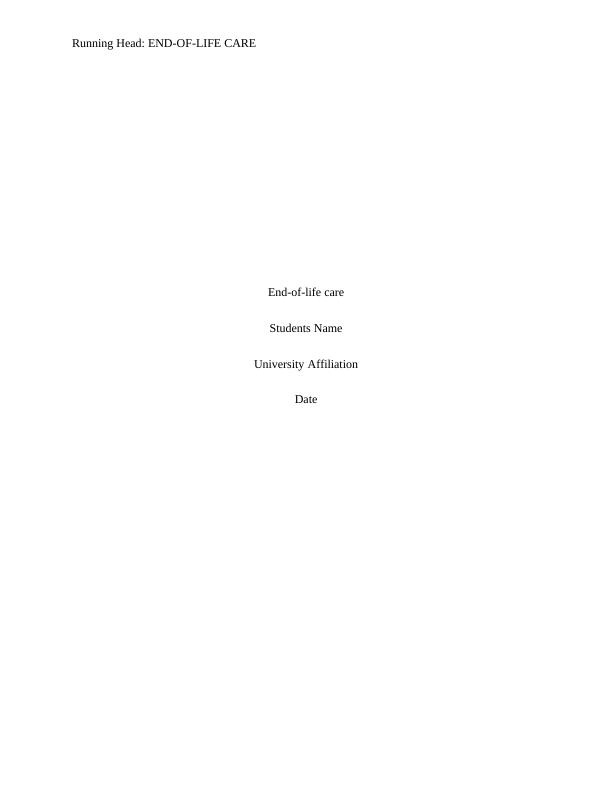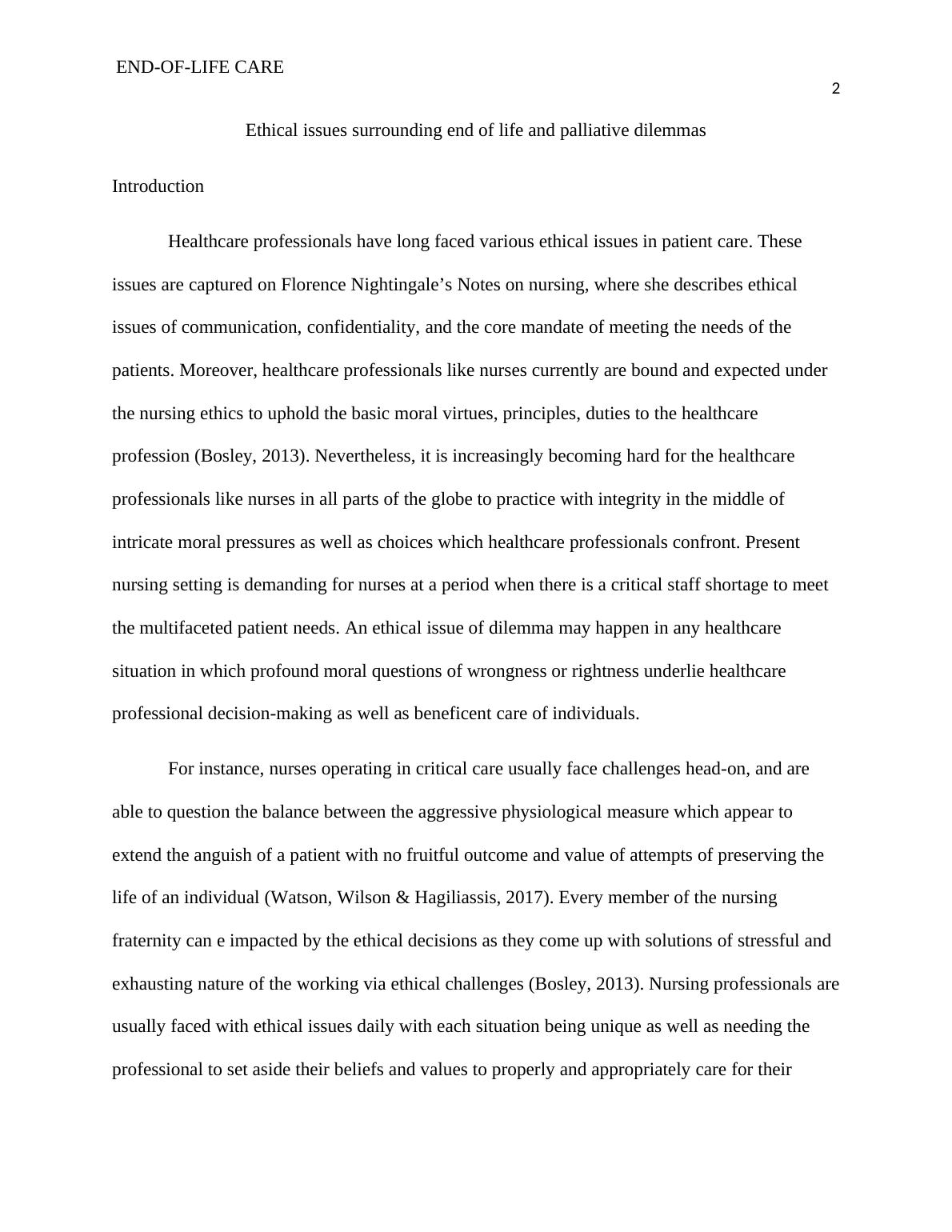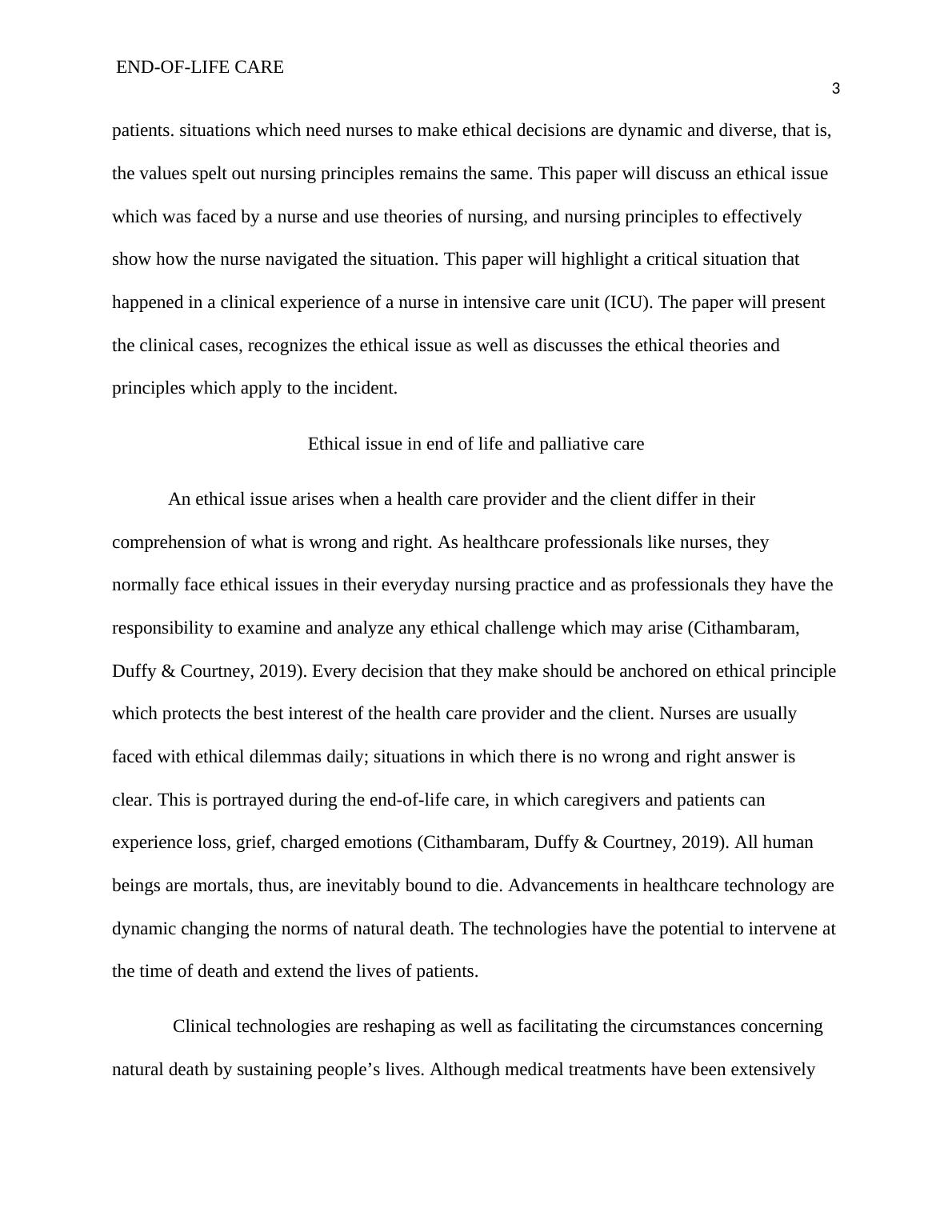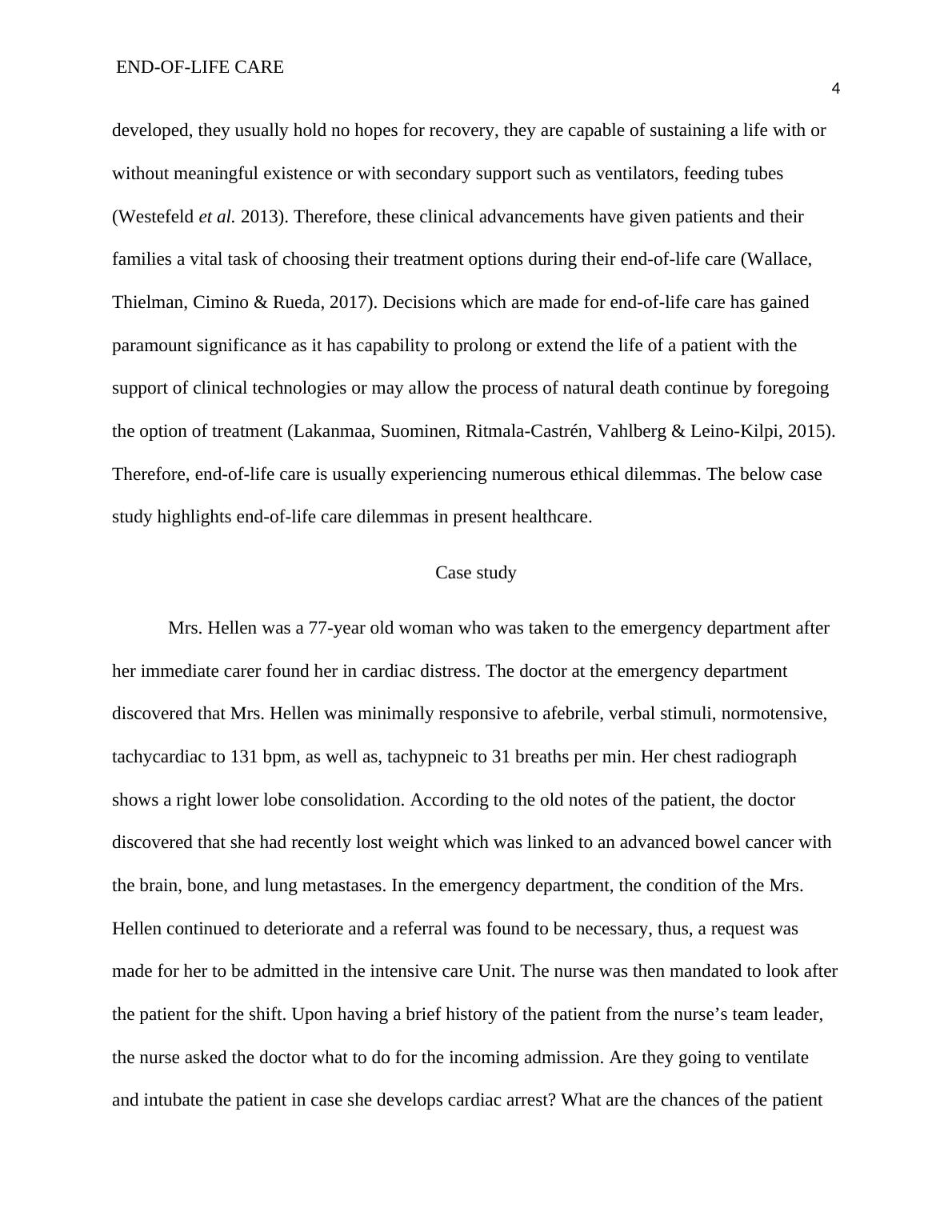Ethical Issues in End-of-Life Care and Palliative Dilemmas
11 Pages2964 Words74 Views
Added on 2023-03-17
About This Document
This article discusses the ethical issues surrounding end-of-life care and palliative dilemmas in healthcare. It explores how healthcare professionals navigate these challenges and make ethical decisions. A case study is included to illustrate the complexities of these situations.
Ethical Issues in End-of-Life Care and Palliative Dilemmas
Added on 2023-03-17
ShareRelated Documents
Running Head: END-OF-LIFE CARE
End-of-life care
Students Name
University Affiliation
Date
End-of-life care
Students Name
University Affiliation
Date

END-OF-LIFE CARE
2
Ethical issues surrounding end of life and palliative dilemmas
Introduction
Healthcare professionals have long faced various ethical issues in patient care. These
issues are captured on Florence Nightingale’s Notes on nursing, where she describes ethical
issues of communication, confidentiality, and the core mandate of meeting the needs of the
patients. Moreover, healthcare professionals like nurses currently are bound and expected under
the nursing ethics to uphold the basic moral virtues, principles, duties to the healthcare
profession (Bosley, 2013). Nevertheless, it is increasingly becoming hard for the healthcare
professionals like nurses in all parts of the globe to practice with integrity in the middle of
intricate moral pressures as well as choices which healthcare professionals confront. Present
nursing setting is demanding for nurses at a period when there is a critical staff shortage to meet
the multifaceted patient needs. An ethical issue of dilemma may happen in any healthcare
situation in which profound moral questions of wrongness or rightness underlie healthcare
professional decision-making as well as beneficent care of individuals.
For instance, nurses operating in critical care usually face challenges head-on, and are
able to question the balance between the aggressive physiological measure which appear to
extend the anguish of a patient with no fruitful outcome and value of attempts of preserving the
life of an individual (Watson, Wilson & Hagiliassis, 2017). Every member of the nursing
fraternity can e impacted by the ethical decisions as they come up with solutions of stressful and
exhausting nature of the working via ethical challenges (Bosley, 2013). Nursing professionals are
usually faced with ethical issues daily with each situation being unique as well as needing the
professional to set aside their beliefs and values to properly and appropriately care for their
2
Ethical issues surrounding end of life and palliative dilemmas
Introduction
Healthcare professionals have long faced various ethical issues in patient care. These
issues are captured on Florence Nightingale’s Notes on nursing, where she describes ethical
issues of communication, confidentiality, and the core mandate of meeting the needs of the
patients. Moreover, healthcare professionals like nurses currently are bound and expected under
the nursing ethics to uphold the basic moral virtues, principles, duties to the healthcare
profession (Bosley, 2013). Nevertheless, it is increasingly becoming hard for the healthcare
professionals like nurses in all parts of the globe to practice with integrity in the middle of
intricate moral pressures as well as choices which healthcare professionals confront. Present
nursing setting is demanding for nurses at a period when there is a critical staff shortage to meet
the multifaceted patient needs. An ethical issue of dilemma may happen in any healthcare
situation in which profound moral questions of wrongness or rightness underlie healthcare
professional decision-making as well as beneficent care of individuals.
For instance, nurses operating in critical care usually face challenges head-on, and are
able to question the balance between the aggressive physiological measure which appear to
extend the anguish of a patient with no fruitful outcome and value of attempts of preserving the
life of an individual (Watson, Wilson & Hagiliassis, 2017). Every member of the nursing
fraternity can e impacted by the ethical decisions as they come up with solutions of stressful and
exhausting nature of the working via ethical challenges (Bosley, 2013). Nursing professionals are
usually faced with ethical issues daily with each situation being unique as well as needing the
professional to set aside their beliefs and values to properly and appropriately care for their

END-OF-LIFE CARE
3
patients. situations which need nurses to make ethical decisions are dynamic and diverse, that is,
the values spelt out nursing principles remains the same. This paper will discuss an ethical issue
which was faced by a nurse and use theories of nursing, and nursing principles to effectively
show how the nurse navigated the situation. This paper will highlight a critical situation that
happened in a clinical experience of a nurse in intensive care unit (ICU). The paper will present
the clinical cases, recognizes the ethical issue as well as discusses the ethical theories and
principles which apply to the incident.
Ethical issue in end of life and palliative care
An ethical issue arises when a health care provider and the client differ in their
comprehension of what is wrong and right. As healthcare professionals like nurses, they
normally face ethical issues in their everyday nursing practice and as professionals they have the
responsibility to examine and analyze any ethical challenge which may arise (Cithambaram,
Duffy & Courtney, 2019). Every decision that they make should be anchored on ethical principle
which protects the best interest of the health care provider and the client. Nurses are usually
faced with ethical dilemmas daily; situations in which there is no wrong and right answer is
clear. This is portrayed during the end-of-life care, in which caregivers and patients can
experience loss, grief, charged emotions (Cithambaram, Duffy & Courtney, 2019). All human
beings are mortals, thus, are inevitably bound to die. Advancements in healthcare technology are
dynamic changing the norms of natural death. The technologies have the potential to intervene at
the time of death and extend the lives of patients.
Clinical technologies are reshaping as well as facilitating the circumstances concerning
natural death by sustaining people’s lives. Although medical treatments have been extensively
3
patients. situations which need nurses to make ethical decisions are dynamic and diverse, that is,
the values spelt out nursing principles remains the same. This paper will discuss an ethical issue
which was faced by a nurse and use theories of nursing, and nursing principles to effectively
show how the nurse navigated the situation. This paper will highlight a critical situation that
happened in a clinical experience of a nurse in intensive care unit (ICU). The paper will present
the clinical cases, recognizes the ethical issue as well as discusses the ethical theories and
principles which apply to the incident.
Ethical issue in end of life and palliative care
An ethical issue arises when a health care provider and the client differ in their
comprehension of what is wrong and right. As healthcare professionals like nurses, they
normally face ethical issues in their everyday nursing practice and as professionals they have the
responsibility to examine and analyze any ethical challenge which may arise (Cithambaram,
Duffy & Courtney, 2019). Every decision that they make should be anchored on ethical principle
which protects the best interest of the health care provider and the client. Nurses are usually
faced with ethical dilemmas daily; situations in which there is no wrong and right answer is
clear. This is portrayed during the end-of-life care, in which caregivers and patients can
experience loss, grief, charged emotions (Cithambaram, Duffy & Courtney, 2019). All human
beings are mortals, thus, are inevitably bound to die. Advancements in healthcare technology are
dynamic changing the norms of natural death. The technologies have the potential to intervene at
the time of death and extend the lives of patients.
Clinical technologies are reshaping as well as facilitating the circumstances concerning
natural death by sustaining people’s lives. Although medical treatments have been extensively

END-OF-LIFE CARE
4
developed, they usually hold no hopes for recovery, they are capable of sustaining a life with or
without meaningful existence or with secondary support such as ventilators, feeding tubes
(Westefeld et al. 2013). Therefore, these clinical advancements have given patients and their
families a vital task of choosing their treatment options during their end-of-life care (Wallace,
Thielman, Cimino & Rueda, 2017). Decisions which are made for end-of-life care has gained
paramount significance as it has capability to prolong or extend the life of a patient with the
support of clinical technologies or may allow the process of natural death continue by foregoing
the option of treatment (Lakanmaa, Suominen, Ritmala-Castrén, Vahlberg & Leino-Kilpi, 2015).
Therefore, end-of-life care is usually experiencing numerous ethical dilemmas. The below case
study highlights end-of-life care dilemmas in present healthcare.
Case study
Mrs. Hellen was a 77-year old woman who was taken to the emergency department after
her immediate carer found her in cardiac distress. The doctor at the emergency department
discovered that Mrs. Hellen was minimally responsive to afebrile, verbal stimuli, normotensive,
tachycardiac to 131 bpm, as well as, tachypneic to 31 breaths per min. Her chest radiograph
shows a right lower lobe consolidation. According to the old notes of the patient, the doctor
discovered that she had recently lost weight which was linked to an advanced bowel cancer with
the brain, bone, and lung metastases. In the emergency department, the condition of the Mrs.
Hellen continued to deteriorate and a referral was found to be necessary, thus, a request was
made for her to be admitted in the intensive care Unit. The nurse was then mandated to look after
the patient for the shift. Upon having a brief history of the patient from the nurse’s team leader,
the nurse asked the doctor what to do for the incoming admission. Are they going to ventilate
and intubate the patient in case she develops cardiac arrest? What are the chances of the patient
4
developed, they usually hold no hopes for recovery, they are capable of sustaining a life with or
without meaningful existence or with secondary support such as ventilators, feeding tubes
(Westefeld et al. 2013). Therefore, these clinical advancements have given patients and their
families a vital task of choosing their treatment options during their end-of-life care (Wallace,
Thielman, Cimino & Rueda, 2017). Decisions which are made for end-of-life care has gained
paramount significance as it has capability to prolong or extend the life of a patient with the
support of clinical technologies or may allow the process of natural death continue by foregoing
the option of treatment (Lakanmaa, Suominen, Ritmala-Castrén, Vahlberg & Leino-Kilpi, 2015).
Therefore, end-of-life care is usually experiencing numerous ethical dilemmas. The below case
study highlights end-of-life care dilemmas in present healthcare.
Case study
Mrs. Hellen was a 77-year old woman who was taken to the emergency department after
her immediate carer found her in cardiac distress. The doctor at the emergency department
discovered that Mrs. Hellen was minimally responsive to afebrile, verbal stimuli, normotensive,
tachycardiac to 131 bpm, as well as, tachypneic to 31 breaths per min. Her chest radiograph
shows a right lower lobe consolidation. According to the old notes of the patient, the doctor
discovered that she had recently lost weight which was linked to an advanced bowel cancer with
the brain, bone, and lung metastases. In the emergency department, the condition of the Mrs.
Hellen continued to deteriorate and a referral was found to be necessary, thus, a request was
made for her to be admitted in the intensive care Unit. The nurse was then mandated to look after
the patient for the shift. Upon having a brief history of the patient from the nurse’s team leader,
the nurse asked the doctor what to do for the incoming admission. Are they going to ventilate
and intubate the patient in case she develops cardiac arrest? What are the chances of the patient

End of preview
Want to access all the pages? Upload your documents or become a member.
Related Documents
Social and Moral Context of Healthcarelg...
|5
|1476
|127
Social and Moral Context of Healthcarelg...
|5
|1476
|152
Professional and Ethical Issues in Nursing Critical Analysis 2022lg...
|17
|4024
|24
Ethical Dilemma in Nursinglg...
|11
|2626
|296
Ethical Dilemma in Nursing Practicelg...
|5
|897
|495
Palliative Care | Case Studylg...
|6
|1734
|15
